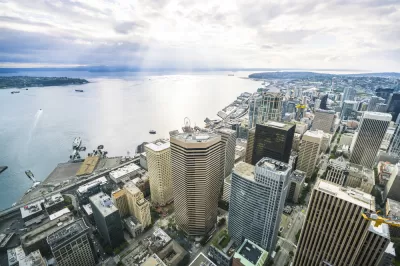Seattle is faced with an affordable housing crisis that has led the new Planning & Community Development Director Sam Assefa to look globally for solutions.

When Samuel Assefa was nominated to lead Seattle's newly consolidated Office of Planning & Community Development in 2016, Mayor Ed Murray touted his experience implementing holistic planning in cities around the United States and the world. In an exclusive interview with Assefa, The Planning Report investigates the global lessons he is applying to the tumultuous situation in Seattle.
Seattle is currently actively trying to address equity and mitigate displacement of existing residents as the communities bear the burden of increased population and diminished housing production. Assefa, who previously oversaw neighborhood redevelopment in San Francisco, shares what he's learned from other cities—and what other cities can learn from Seattle—on producing affordable housing, accommodating future growth, and revitalizing city centers for the next generation. Communication of why new housing needs to occur in many parts of the city, he says, is critical for residents to understand the overall challenge and opportunity of planning.
As part of Seattle's Housing Affordability and Livability Agenda, the city released a report that laid out two scenarios regarding upzoning and modeling potential displacement. In one, neighborhoods across the city are evenly upzoned for greater density. As Jen Kenney of Next City lays out: "In the other, neighborhoods with high displacement risk and low opportunity are upzoned to a lesser degree. The report, a draft environmental impact statement for the city's new inclusionary zoning policy, gets to the heart of an ideological battle playing out in many cities."
Assefa helped establish a Capital Cabinet with the heads of all the departments that manage capital projects, such as City Light (the city's electric utility), Public Utilities, Parks, Transportation, Housing, Economic Development, and a few others. The cabinet helps better coordinate and integrate the city's investments.
Using the holistic model of local government he learned from Mayor Richard Daley in Chicago, Assefa has embedded the 'team-first' mentality that believes that each of the services the city provides should not be viewed as the work of individual departments and rather be viewed as services of "the city."
Now, Assefa is charged with envisioning the future of the Seattle Center, which is one of Mayor Murray's key initiatives. Utilizing his experience of championing Millennium Park in Chicago, Assefa is thinking about how the Seattle Center can remain relevant to future generations, and what version of the Millennium Park story could take place in Seattle.
Read more in The Planning Report.
FULL STORY: Seattle's Management of an Integrated, Equitable Budget & Planning Process Has a Leader

Maui's Vacation Rental Debate Turns Ugly
Verbal attacks, misinformation campaigns and fistfights plague a high-stakes debate to convert thousands of vacation rentals into long-term housing.

Planetizen Federal Action Tracker
A weekly monitor of how Trump’s orders and actions are impacting planners and planning in America.

Chicago’s Ghost Rails
Just beneath the surface of the modern city lie the remnants of its expansive early 20th-century streetcar system.

Bend, Oregon Zoning Reforms Prioritize Small-Scale Housing
The city altered its zoning code to allow multi-family housing and eliminated parking mandates citywide.

Amtrak Cutting Jobs, Funding to High-Speed Rail
The agency plans to cut 10 percent of its workforce and has confirmed it will not fund new high-speed rail projects.

LA Denies Basic Services to Unhoused Residents
The city has repeatedly failed to respond to requests for trash pickup at encampment sites, and eliminated a program that provided mobile showers and toilets.
Urban Design for Planners 1: Software Tools
This six-course series explores essential urban design concepts using open source software and equips planners with the tools they need to participate fully in the urban design process.
Planning for Universal Design
Learn the tools for implementing Universal Design in planning regulations.
planning NEXT
Appalachian Highlands Housing Partners
Mpact (founded as Rail~Volution)
City of Camden Redevelopment Agency
City of Astoria
City of Portland
City of Laramie





























